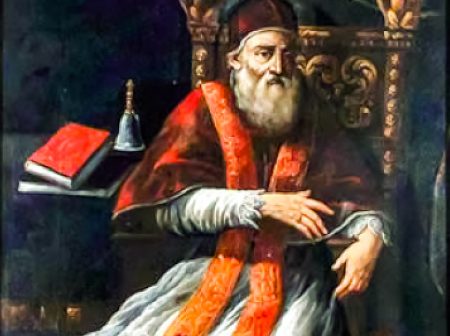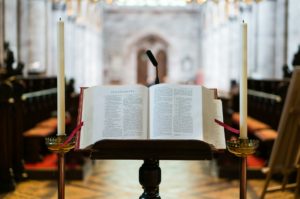I once visited a friend’s Plymouth Brethren assembly. On the marquee outside it said, “No creed but the Bible.” Upon entering, however, I was handed a monthly newsletter featuring a quotation from their founder, John Nelson Darby. It publicized Sunday school and Wednesday night youth group—extra-biblical traditions. My Brethren friend spoke of the “Trinity” and “Great Commission” (terminology that’s foreign to Scripture). I’m unsure if they possessed a doctrinal statement, but they did have a gigantic wall hanging that plotted end-time events from the rapture to eternity. As to the authority assigned to the chart, I doubt they could have been more emphatic (a fact I learned firsthand by challenging one of its points).
Frankly, I find the sort of biblicism that I encountered at my friend’s assembly to be unhelpful. Whether we admit it or not, we all maintain a degree of church tradition. Denying that it exists or gainsaying its authority is disingenuous. On the other hand, we must keep in mind Jesus’s caution to not allow the traditions of men to become confused with the Word of God. How then shall Protestants who maintain the principle of sola scriptura (Scripture alone) celebrate traditions in the context of church life, while exercising a proper amount of caution? For the answer we will visit 16th-century Italy.
Italian Reformers on Tradition
Let’s begin by considering how church tradition functioned in the centuries preceding the Reformation. Tradition, it turns out, was central to the life of the church from its earliest days. The content of this tradition was identified as the rule of faith (regula fidei), a formulation of the chief elements of Christian doctrine that were handed down from Christ and the apostles. While Scripture served as the norming authority throughout late antiquity and into the Middle Age, the concept of tradition eventually expanded to also include various ideas of bishops, councils, and occasionally of universities. Thus, the notion of tradition rooted in the early church’s rule of faith was gradually combined by the broader application of tradition in the multitude of theological formulae and ecclesiastical practices that had accumulated over the centuries.
By the 16th century some advocates of renewal, most notably Protestants, expressed concern for the apparent confusion between divine and human revelation. Swiss and Italian Reformers, far more than Luther, approached this matter with a humanist mentality. A cursory reading of Bucer, Calvin, or Vermigli, in which they regularly cite such sources from the history of the church—particularly the fathers—illustrates this fact. They celebrated the texture of the Christian tradition, the sacred deposit that informed and enriched evangelical faith. They did not, however, regard the church fathers as their fundamental authority. It was to Scripture alone that they would look for this authority.
Let us now focus specifically on the Italian Reformation. When Reformers such as Peter Martyr Vermigli (1499-1562) found Catholic interlocutors failing to prioritize Scripture over church tradition, he objected in forceful terms: “We have certain adversaries who judge little or nothing at all on the basis of the Holy Scriptures, but measure all their religion by the Fathers and councils, so much that they can be called Patrologi instead of Theologi.”[1] Of church councils, Vermigli said they “should not be heard without selectivity and judgment. We ought to receive and reverence only those which have kept their doctrine within the rule of Holy Scriptures.”[2] Finally, concerning those practices that grew up over centuries with insufficient biblical support, Vermigli called them out: “Auricular confession also, derived from the papists, is completely superstitious; therefore we utterly reject it, for they impose it as something necessary for salvation and a reason why sins should be forgiven, which they are never able to provide from the testimonies of Scripture.”[3]
Catholic Response
While some evangelically minded prelates had gathered around Gasparo Contarini in the interest of effecting reform—the so-called Spirituali—another circle united around Cardinal Gian Pietro Carafa (later Pope Paul IV). This group was known as the Zelanti, and they were passionate that “reform meant not accommodation with the Protestants but an increase of discipline in the Church and the swift, resolute repression of dissenters.”[4] These Zelanti insisted that Protestants must embrace traditional church teaching and submit to papal authority; anything less was a corruption of the faith. This conviction eventually led to their indexes of forbidden books and inquisitions, in which they opposed evangelical renewal, especially its prioritization of Scripture.
A crucial moment of the Italian Reformation came in the years 1541-42. Gasparo Contarini had died and the two greatest preachers of the movement, Bernardino Ochino and Peter Martyr Vermigli, fled north of the Alps into Switzerland. Meanwhile, threatened by the advance of evangelical Protestantism in Italy, Paul III empowered the Inquisition, and the Zelanti were prepared to arrest every last evangelical. Gian Matteo Giberti, Bishop of Verona and supporter of evangelicalism, recognized the movement’s demise in Italy when he wrote to a friend in 1542: “With the deaths of some of our spirituali [Catholic evangelicals] and the exile of others, I believe that it would be best to leave their company.”[5]
An illustration of the growing opposition to evangelical faith was portrayed in an incident that occurred in the city of Rome. On February 17, 1550, as a prominent evangelical leader named Marcantonio Flaminio lay dying at his friend’s house, Cardinal Carafa, the Darth Vader of the anti-evangelical Zelanti, managed to hide himself near Flaminio’s bed to hear his Last Rites—to see whether his suspicions of Flaminio’s evangelical faith would be confirmed.[6] The idea of a Cardinal, soon to be crowned Pope Paul IV, hiding himself in a dying man’s bedroom to hear his final confession illustrates the indefatigable commitment of the Zelanti to assert Roman tradition. In the final analysis, such tradition won the day in Italy over the evangelical doctrine of Scripture.
Word to Evangelical Protestants
I like how the late Harold O. J. Brown frames the challenge. Concerning the role of tradition in the church he said, “If we consider faith as a climber trying to scale a snowy mountain peak, the one group [Roman Catholics] will have him so packed in flowing garments that he can hardly move, while the other [evangelical biblicists] might have him naked and barefoot—or to be more decent, in short and sneakers—and in imminent danger of hypothermia.”[7]
How then shall Protestants who recognize Scripture alone as inspired revelation celebrate our traditions without allowing them to eclipse the authority of the Bible? In other words, how can we avoid Zelantism on one hand and biblicism on the other? Here are three brief suggestions. First, let us remember that the Reformed tradition has always maintained an appreciation for biblically rooted traditions, whether it is a study of the church fathers, early ecumenical councils, or various creedal statements produced by Reformed theologians in the late 16th— and early 17th—century.[8] The Reformed tradition joyfully celebrates ideas, disciplines, and practices that emerge from Scripture.
Second, let us not confuse “nuda scriptura” (essentially the biblicist position)[9] with sola scriptura. The former removes tradition from the ongoing life of the church, insisting that the Bible functions as the only explicit source of authority for Christian faith and practice. Well-intentioned as this approach may be, it turns out to be a reduction that obscures the meaning of God’s Word by limiting its application, that is, by denying it the opportunity of speaking to the range of particular life situations that are not explicated by the biblical text. Third, let’s be cautious in how we uphold traditions, since we are vulnerable to human error. As Brown helpfully summarizes: “We need to accept tradition in principle, and at the same time we need to be critical of traditions, both our own and those of others, lest they become the ‘commandments of men’ about which Jesus warns us.”[10]
Footnotes:
[1] Vermigli, Pietro Martire. In epistolam S. Pauli apostoli ad Romanos …. (Basel: Apud Petrum Perna, 1560), 1236. For an English translation of Vermigli’s Romans Locus, see Peter Martyr Vermigli, Predestination and Justification: Two Theological Loci, trans. and ed. Frank A. James, III, The Peter Martyr Library 8 (Kirksville, MO: Truman State University Press, 2003), 143. Further footnotes will indicate pages from James’ translation in brackets.
[2]Ibid., 1245-1247. [152-155].
[3] Ibid., 1230 [136].
[4] John Jeffries Martin, Venice’s Hidden Enemies: Italian Heretics in a Renaissance City, (Baltimore: The John Hopkins University Press: 2004), 39.
[5] A. Prosperi, Tra Evangelismo e Controriforma: G.M. Giberti (1495-1543), (Rome: Edizioni di Storia e Letteratura, 1969), 314, cited in Martin, Venice’s Hidden Enemies, 43.
[6] Dermot Fenlon, Heresy and Obedience in Tridentine Italy: Cardinal Pole and the Counter Reformation. (Cambridge: Cambridge University Press, 1972), 212.
[7] Harold O.J. Brown. Reclaiming the Great Tradition. James S. Cutsinger, ed. (Downers Grove: InterVarsity Press, 1997), 77
[8] For example, the Belgic Confession (1561), The Heidelberg Confession (1563), the London Baptist Confession (1646) and The Westminster Confession of Faith (1647).
[9] Literally “nude Scipture,” also referred to as nulla traditio, “no tradition.”
[10] Brown, Reclaiming the Great Tradition, 85.





